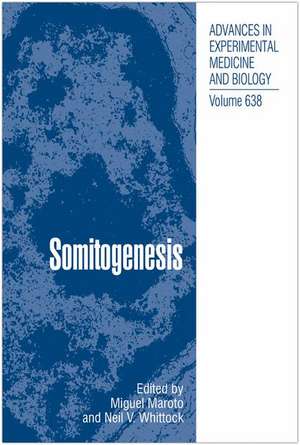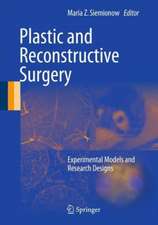Somitogenesis: Advances in Experimental Medicine and Biology, cartea 638
Editat de Miguel Maroto, Neil V. Whittocken Limba Engleză Hardback – 14 aug 2008
Toate formatele și edițiile
| Toate formatele și edițiile | Preț | Express |
|---|---|---|
| Paperback (1) | 1408.03 lei 6-8 săpt. | |
| Springer – 25 noi 2010 | 1408.03 lei 6-8 săpt. | |
| Hardback (1) | 1412.99 lei 6-8 săpt. | |
| Springer – 14 aug 2008 | 1412.99 lei 6-8 săpt. |
Din seria Advances in Experimental Medicine and Biology
- 9%
 Preț: 719.60 lei
Preț: 719.60 lei - 20%
 Preț: 691.93 lei
Preț: 691.93 lei - 5%
 Preț: 717.00 lei
Preț: 717.00 lei - 5%
 Preț: 716.28 lei
Preț: 716.28 lei - 5%
 Preț: 717.20 lei
Preț: 717.20 lei - 15%
 Preț: 640.24 lei
Preț: 640.24 lei - 5%
 Preț: 1113.83 lei
Preț: 1113.83 lei - 5%
 Preț: 715.71 lei
Preț: 715.71 lei - 5%
 Preț: 820.43 lei
Preț: 820.43 lei - 15%
 Preț: 641.38 lei
Preț: 641.38 lei - 5%
 Preț: 716.28 lei
Preț: 716.28 lei - 5%
 Preț: 523.99 lei
Preț: 523.99 lei - 5%
 Preț: 1031.00 lei
Preț: 1031.00 lei - 5%
 Preț: 717.00 lei
Preț: 717.00 lei - 5%
 Preț: 715.35 lei
Preț: 715.35 lei - 20%
 Preț: 1161.71 lei
Preț: 1161.71 lei - 5%
 Preț: 1170.51 lei
Preț: 1170.51 lei - 18%
 Preț: 1119.87 lei
Preț: 1119.87 lei - 5%
 Preț: 1288.48 lei
Preț: 1288.48 lei - 5%
 Preț: 1164.67 lei
Preț: 1164.67 lei - 5%
 Preț: 1101.73 lei
Preț: 1101.73 lei - 18%
 Preț: 1123.67 lei
Preț: 1123.67 lei - 5%
 Preț: 1435.64 lei
Preț: 1435.64 lei - 20%
 Preț: 1044.10 lei
Preț: 1044.10 lei - 18%
 Preț: 946.39 lei
Preț: 946.39 lei - 5%
 Preț: 292.57 lei
Preț: 292.57 lei - 18%
 Preț: 957.62 lei
Preț: 957.62 lei - 18%
 Preț: 1235.76 lei
Preț: 1235.76 lei - 5%
 Preț: 1231.55 lei
Preț: 1231.55 lei - 5%
 Preț: 1292.30 lei
Preț: 1292.30 lei - 5%
 Preț: 1102.10 lei
Preț: 1102.10 lei - 18%
 Preț: 1132.81 lei
Preț: 1132.81 lei - 5%
 Preț: 1165.19 lei
Preț: 1165.19 lei - 5%
 Preț: 1418.48 lei
Preț: 1418.48 lei - 5%
 Preț: 1305.63 lei
Preț: 1305.63 lei - 18%
 Preț: 1417.72 lei
Preț: 1417.72 lei - 18%
 Preț: 1412.99 lei
Preț: 1412.99 lei - 24%
 Preț: 806.16 lei
Preț: 806.16 lei - 18%
 Preț: 1243.29 lei
Preț: 1243.29 lei - 5%
 Preț: 1429.44 lei
Preț: 1429.44 lei - 5%
 Preț: 1618.70 lei
Preț: 1618.70 lei - 5%
 Preț: 1305.12 lei
Preț: 1305.12 lei - 18%
 Preț: 1124.92 lei
Preț: 1124.92 lei - 5%
 Preț: 1097.54 lei
Preț: 1097.54 lei - 15%
 Preț: 649.87 lei
Preț: 649.87 lei - 5%
 Preț: 1097.54 lei
Preț: 1097.54 lei - 18%
 Preț: 945.79 lei
Preț: 945.79 lei - 5%
 Preț: 1123.16 lei
Preț: 1123.16 lei
Preț: 1412.99 lei
Preț vechi: 1487.36 lei
-5% Nou
Puncte Express: 2119
Preț estimativ în valută:
270.44€ • 291.92$ • 226.76£
270.44€ • 291.92$ • 226.76£
Carte tipărită la comandă
Livrare economică 18 aprilie-02 mai
Preluare comenzi: 021 569.72.76
Specificații
ISBN-13: 9780387096056
ISBN-10: 0387096051
Pagini: 194
Ilustrații: VIII, 194 p. 47 illus.
Dimensiuni: 155 x 235 x 15 mm
Greutate: 0.5 kg
Ediția:2009
Editura: Springer
Colecția Springer
Seria Advances in Experimental Medicine and Biology
Locul publicării:New York, NY, United States
ISBN-10: 0387096051
Pagini: 194
Ilustrații: VIII, 194 p. 47 illus.
Dimensiuni: 155 x 235 x 15 mm
Greutate: 0.5 kg
Ediția:2009
Editura: Springer
Colecția Springer
Seria Advances in Experimental Medicine and Biology
Locul publicării:New York, NY, United States
Public țintă
ResearchCuprins
Formation and Differentiation of Avian Somite Derivatives.- Avian Somitogenesis: Translating Time and Space into Pattern.- Genetic Analysis of Somite Formation in Laboratory Fish Models.- Old Wares and New: Five Decades of Investigation of Somitogenesis in Xenopus laevis.- Role of Delta-Like-3 in Mammalian Somitogenesis and Vertebral Column Formation.- Mesp-Family Genes Are Required for Segmental Patterning and Segmental Border Formation.- bHLH Proteins and Their Role in Somitogenesis.- Mouse Mutations Disrupting Somitogenesis and Vertebral Patterning.- Defective Somitogenesis and Abnormal Vertebral Segmentation in Man.
Notă biografică
MIGUEL MAROTO is a MRC Career Development Fellow and Lecturer at the University of Dundee, UK. He received his PhD in Biochemistry and Molecular Biology from the Department of Biochemistry of the Universidad Autonoma of Madrid, Spain. His research interests include investigating the biochemical basis of different signalling mechanisms implicated in the acquisition of specific cell fates during vertebrate development. In recent years he has been involved in the analysis of the mechanism of the molecular clock in the control of the process of somitogenesis.
NEIL V. WHITTOCK gained his PhD in Human Molecular Genetics whilst working at Guys’ and St Thomas’ Hospitals in London, UK. His research focussed on developing diagnostic genetic tests for Duchenne muscular dystrophy before moving on to identifying genes involved in bullous skin disorders. He then continued his research as a postdoctoral fellow at the University of Dundee before arriving at the University of Exeter where he spent three years working alongside Dr Peter Turnpenny. The work at Exeter focussed on the identification of genes involved in human genetic disorders that affected the development of the spine and ribs, specifically the spondylocostal dysostoses. He now works as an Ambulance Technician in Devon, UK. and runs his own antique clock restoration business.
NEIL V. WHITTOCK gained his PhD in Human Molecular Genetics whilst working at Guys’ and St Thomas’ Hospitals in London, UK. His research focussed on developing diagnostic genetic tests for Duchenne muscular dystrophy before moving on to identifying genes involved in bullous skin disorders. He then continued his research as a postdoctoral fellow at the University of Dundee before arriving at the University of Exeter where he spent three years working alongside Dr Peter Turnpenny. The work at Exeter focussed on the identification of genes involved in human genetic disorders that affected the development of the spine and ribs, specifically the spondylocostal dysostoses. He now works as an Ambulance Technician in Devon, UK. and runs his own antique clock restoration business.











